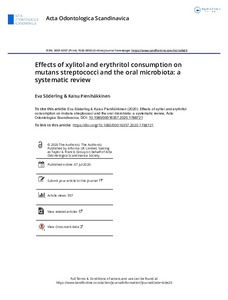Effects of xylitol and erythritol consumption on mutans streptococci and the oral microbiota: a systematic review
Eva Söderling; Kaisu Pienihäkkinen
Effects of xylitol and erythritol consumption on mutans streptococci and the oral microbiota: a systematic review
Eva Söderling
Kaisu Pienihäkkinen
TAYLOR & FRANCIS LTD
Julkaisun pysyvä osoite on:
https://urn.fi/URN:NBN:fi-fe2021042821831
https://urn.fi/URN:NBN:fi-fe2021042821831
Tiivistelmä
Objective: A systematic review of published data was conducted with the aim of assessing effects of xylitol and erythritol consumption on levels of mutans streptococci (MS) and the oral microbiota.
Materials and methods: Electronic and hand searches were performed to find clinical microbiological studies concerning the consumption of xylitol and erythritol chewing gum or candies, and published between 2000 and 2019. Prospective randomized controlled clinical trials conducted in healthy subjects were included in the review.
Results: The initial search identified 561 xylitol and 83 erythritol studies. After applying inclusion and exclusion criteria, 21 xylitol studies and one erythritol study were reviewed. The review identified nine xylitol studies with a fair or high quality, four conducted in children and five in adults, all demonstrating a decrease in MS levels in association with habitual consumption of xylitol. The three microbiota studies employing multispecies probe approaches revealed no effects for xylitol on the microbiota. The only erythritol study fulfilling the inclusion criteria showed no consistent effects on MS levels. Conclusions:Xylitol consumption is likely to decrease MS counts but it may not change the overall microbiota. Xylitol shows thus properties of an oral prebiotic. More studies are needed to demonstrate the effects of erythritol on MS.
Kokoelmat
- Rinnakkaistallenteet [29335]
